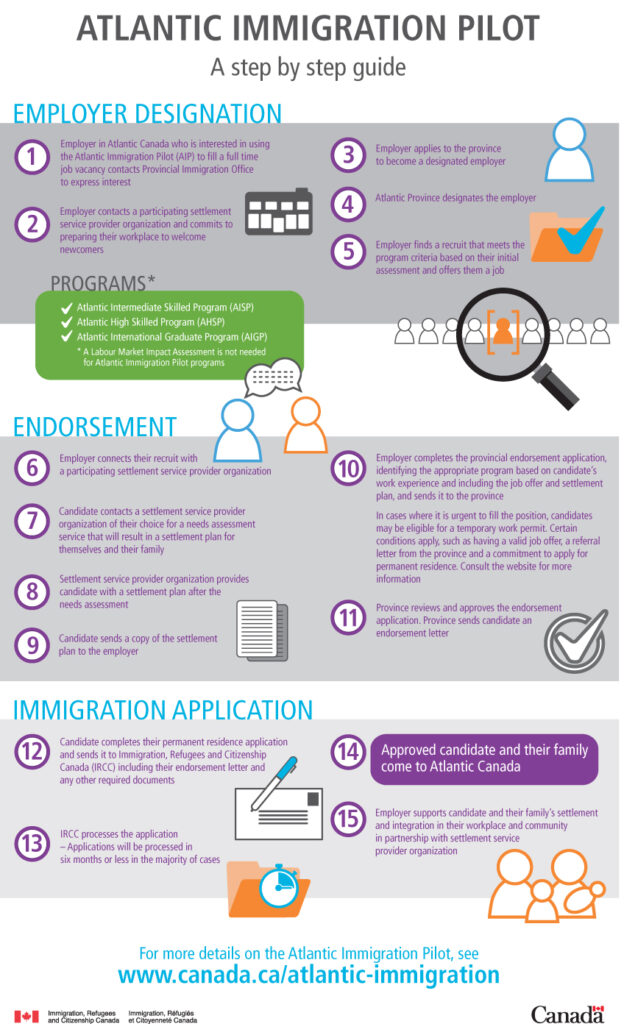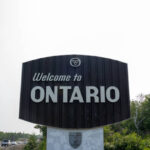
Thinking of permanent residency in Canada (as a skilled immigrant)? The Atlantic Immigration Program (AIP) is available. This is different from the popular Express Entry System.
This post here covers:
- What is the Atlantic Immigrant Program (AIP)
- How to become a permanent resident in Canada using the AIP
- AIP requirements and procedures
- How to look for AIP job offers
- AIP Application Fees and Costs involved
What is the Atlantic Immigration Program (AIP)?
Canada’s Atlantic region (comprising the four provinces of Prince Edward Island, New Brunswick, Nova Scotia, and Newfoundland and Labrador) is one of the 5 regions in the country. The other 4 regions are:
- West Coast (British Columbia)
- Central Canada (Ontario and Quebec)
- The Prairies (Manitoba, Saskatchewan, Alberta) and
- The Northern Territories (Nunavut, Yukon, Northwest Territories)
In 2017, the Government of Canada started the Atlantic Immigrant Program (AIP) as a pilot program. The AIP started as an initial 3-year pilot (and has now been made permanent). The program allows local employers in the Atlantic provinces to identify, recruit and retain global talent as permanent residents in the region.
The program also helps employers in Atlantic Canada to hire foreign skilled workers who want to immigrate to Atlantic Canada and international graduates who wish to stay in Atlantic Canada after they graduate from postsecondary institutions in any of the provinces in the region.
This aims to support population growth, develop a skilled workforce, and increase employment rates in the Atlantic region. More information on this is available here
AIP Requirements
There are 3 sub-programs in AIP:
- Atlantic International Graduate Program (for graduates from an institution in the region). Details available here.
- Atlantic High-skilled Program (if you have 1-year experience in TEER 0, 1, 2, or 3 jobs). Details available here
- Atlantic Intermediate-skilled Program (if you have 1-year experience in a TEER 4 job or as a Nurse). Details available here
Any of the 3 sub-programs above can be used to hire qualified candidates (in or outside Canada) for jobs the employers in Atlantic Canada have not been able to fill locally.
If you’re applying from outside Canada, or you have not studied in the Atlantic region as an international student, your focus should be the Atlantic High-skilled or Intermediate-skilled Program. However, if you have studied in the region, you may be eligible for the International Graduate program.
International graduates
One interesting aspect of the International Graduate component is that you don’t need previous work experience. Check the details below:
You do not need to meet the work experience requirements if you’re an international graduate who
- has a degree, diploma, certificate, or trade or apprenticeship certification that
- took at least 2 years of studies
- is from a recognized post-secondary institution in 1 of the 4 Atlantic provinces (New Brunswick, Nova Scotia, Prince Edward Island, or Newfoundland and Labrador)
- was a full-time student for the entire time you were studying
- lived in one of the following provinces for at least 16 months during the last 2 years before you graduated
- New Brunswick
- Nova Scotia
- Newfoundland and Labrador or
- Prince Edward Island
- had the visa or permit you needed to work, study or get training while you were in Canada
Importantly, the AIP is an employer-driven program. What this means is that you must have an eligible job offer from a designated employer in the Atlantic province. Looking for a job offer is, therefore, the first thing to do. There are several ways to do this, and I will explain below.
You will then apply based on the NOC/TEER classification of your job. If you want to know the NOC category of your job or work experience, you can find your NOC here.
Once the NOC/TEER is decided, there are other requirements to fulfill.
The job offer must also be:
- Full-time
- Non-seasonal
- Fit the NOC level of the program you are applying to; and
- Last for at least one (1) year in duration (1 year from the time the candidate becomes a permanent resident) if you’re offered a NOC 2021 TEER 0, 1, 2, or 3 category job. or a permanent position if you’re offered a NOC 2021 TEER 4 category job.
How to look for AIP job offers
There are designated employers for the AIP in the four (4) Atlantic provinces. What this means is that these are the only employers you can get a job offer from, and use the job offer for the AIP.
- Designated employers in Prince Edward Island are available here
- Designated employers in Nova Scotia are available here
- Designated employers in New Brunswick are available here
- Designated employers in Newfoundland and Labrador are available here
Please note that this list does not mean the employers are currently recruiting.
However, with the list of designated employers in each province, you know where to search for available jobs. Almost (if not) all the employers have websites with career/recruitment sections. The next practical steps to take in looking for a job are:
- Decide your NOC
- Find employers in your field
- Look up the career websites of the employers in your field
- Regularly visit their websites for available jobs
- Prepare your application packages and continue to reach out and apply to as many jobs as you can
- Look for and connect with recruiters in these provinces to help with your job search as well
Some employers/provinces also regularly travel around the world to scout for employees. New Brunswick is very popular for this. Available global recruitments in New Brunswick can be found here
Other AIP Procedures
Once you get a job offer from a designated employer, some paperwork will be done by both the employer and the applicant, and you are good to go with your Permanent Residence Application.

In cases where it is urgent to fill the position, applicants may be eligible to apply for a temporary work permit to come into Canada to begin their job before the application for permanent residence is finalized. Details available here
Language Test/Proof of Funds/Application Fees
Compared to the popular Express Entry system, the language score and proof of settlement funds required for the AIP are also lower.
- The required language test score for AIPP is a Canadian Language Benchmark (CLB) 4. Details of this are available here
- As of April 2024, the required proof of funds (POF) for AIP is also by family members. In comparison, the POF for one applicant in Express Entry is $13,757; and in AIPP it is just $3,439. Details available here
- The application fees for the AIP are the same as other permanent residence applications in Canada
Submitting your final AIP Application
You can only submit your application for Permanent Residence (under the AIP), after you and the employer have completed all the steps above.
Unlike the Express Entry, the AIP is also a paper application (although IRCC is currently testing a new online application portal. You will mail your application to the Centralized Intake Office (CIO) in Sydney, NS, Canada.
Summary of AIP Process
In summary, to become a permanent resident in Canada through the Atlantic Immigration Program (AIP).
- Decide your eligibility for the program.
- Find and receive an eligible job offer from a designated employer
- Do all the paperwork to get the required endorsement
- Apply for a work permit to arrive and begin your job in Canada (if you are eligible for that)
- Submit your application for Permanent Residence.
I hope someone finds this useful!
If you have questions on Career & Personal Development, Personal Finance, or Building a Personal Brand and want to reach out to us, check what we have here.
DISCLAIMER: The posts and information on this website are not legal advice. We are not Canadian Immigration Consultants and do NOT provide Canadian Immigration Services. For any authorized Canadian Immigration information, services, or support, please check the Government of Canada website at www.canada.ca/immigration
© Olu of Canada




